12-31-23
The Promised Land: Something Is Rotten in the State of Denmark
By Diane Sippl
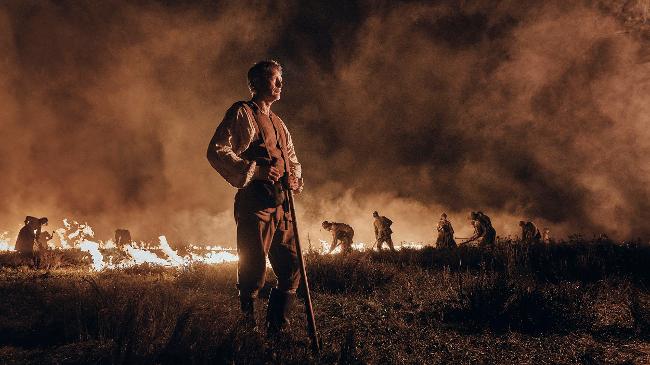
When I had the utterly transformative experience of becoming a father a few years ago, I began viewing my past films, including the memories of making them, through a new lens. While I remain proud of the work (most of it, anyway!), it reflects the outlook of a man with a single purpose; a passionate dedication to creating stories and art... but not much else. The Promised Land grew out of that existential reckoning, and is, by far, my most personal film to date. Aided by Ida Jessen’s brilliant novel, Anders Thomas Jensen and I wanted to tell a grand, epic tale about how our ambitions and desires will inevitably fail if they are all we have. Life is chaos; painful and ugly, beautiful and extraordinary, and we are often helpless to control it. As the saying goes, “We make plans and God laughs.”
Co-writer and Director Nikolaj Arcel
Recently shortlisted in the “top 15” of the nearly 90 films submitted from around the world for the Best International Feature at the 96th Academy Awards, Nikolaj Arcel’s new film, The Promised Land, is yet another feather in his cap. Many will recall with delight his surprising period drama, A Royal Affair, which won a nomination for the same award in 2013; it was also written by him (as was The Promised Land, or Bastarden), and it also starred Mads Mikkelsen.
This year’s contender was co-written with the prolific Anders Thomas Jensen, the two screenwriters adapting Ida Jessen’s novel, The Captain and Ann Barbara (2020). Set in the mid-18th century, The Promised Land brings us Captain Ludvig Kahlen (Mads Mikkelsen), a war hero without money or inherited status, whose quest is to turn the vast heath of Jutland into productive farmland, to settle it in the King’s name, and to gain a title for himself. But one Frederik De Schinkel, a ruthless tyrant, already rules over this same swath of rugged Denmark and senses a threat to his power from Kahlen. The locals and the climate don’t make it any easier for Kahlen, and he doesn’t feel blessed when a couple fleeing the rapacious De Schinkel turns up at his door. Against all odds, a rag-tag collective of farmers takes shape and builds a stake in the land. De Schinkel won’t hear of it, and he stages a brutal comeuppance against Kahlen in a violent battle of wills.
In a sweeping epic, what Nikolaj Arcel creates is a character study that, in fact, doesn’t exclude the women of the era but presents, alongside the sparring men, three females—a “lady,” a servant, and a Roma girl—each fighting her own battles within straitjackets of the social order.
What follows are selected comments made by Nikolaj Arcel and Mads Mikkelsen following its screening in Hollywood at the 2023 AFI FEST.
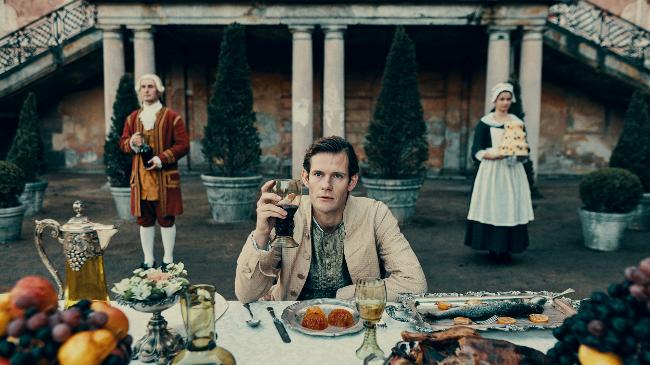
What attracted you both to the project?
Mads Mikkelsen Generally, I loved the idea of a man who so desperately wants to be a part of something that he hates. I think that’s very human, it’s very relatable, and I think Nikolaj and Anders Thomas gave life to that in the script, from the beginning.
Nikolaj Arcel But I also remember that you were very much a part of shaping the character in the final stages of the script, and you gave me a lot of courage to… I mean, he’s not exactly a likeable character. All my other films up until this moment have been a little more black and white in terms of heroes and villains. There are certainly some pretty bad characters in this one as well, but my idea was, this is a man who is so ‘pure ambition’ that he can’t see life around him. And you had very strong opinions; you wanted to really do it and not immediately show, ‘Oh, he’s also a good guy. He also saved people…’ It was interesting to work on a character like that. It was very gratifying.
MM I think when we do period films, like this one—set in the 1750s—we always have a tendency to shove our 2023 morals into the story, into the characters, into every step on the way. I knew we were not doing it, but there were still some reminiscences of it. When I came on board I was like, ‘But that little, tiny Buster Keaton smile, that hopefully will open up this guy, is not gonna happen, until page 88’. This is the character. The character is the story in many ways. He has plenty of opportunities to go left instead of right, and that would change the story, and it wouldn’t be dramatic; he would just be one of us. We agreed on that. But we also looked at each other every day we were shooting, and after like twenty days of shooting, we were like, ‘Should we soften him up now?’ And we went ‘No, no no…We’re gonna wait… it’s on page 88’. So yea, we have to be honest and true to the story, and I think you guys did the base of that, and then I insisted on more.
NA Yea, it was a really hard process, but it’s extremely nice to work with Mads, because we had a very strong collaboration for this film as well, where we would discuss the next day of shooting and sit well into the night talking about possibilities, ideas, motivations, and the psychological underpinning of each scene. And it’s not that often that you can do that with an actor. Mads is actually focused on the whole film—not just his character, but the entire story. He feels a sense of responsibility for it all, which is great for a director, because then you take the whole story under your wing alongside me, which is a really good thing. And you did that on A Royal Affair as well.
MM Yea, I do read the story first, and then the character later. And if there’s nothing to say about my character, I’ll jump right on board to some of the other characters and say, ‘Why don’t we go like that, because that’s going to emphasize exactly what you want do?’ So I’m a tiny writer who’s not a writer.
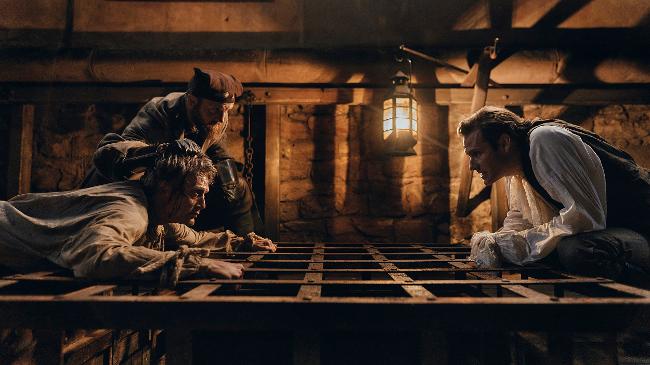
Given that The Promised Land is reminiscent of Hollywood epics and western films, were there any inspirations that you looked to while you were working on the project?
NA I was looking toward David Lean films, of yore. I’ve always been a huge David Lean fan. Lawrence of Arabia is one of my top three films. I can just watch it again and again and again. I love the movie and I like his way of making these huge epics but also with quite complex characters and quite intimate storytelling, the way Peter O’Toole portrays Lawrence. You know Lawrence is so ahead of his time, but it’s still a very epic adventure movie. Of course, we had about one-thousandth of the budget of what they had, but I tried to get the feeling of that epic film.
MM I can’t add to that because I’m not the filmmaker, I’m just the actor. But I can say, honestly, that there’s a question I don’t get here, but I always get it in Europe. It’s like, ‘What’s the difference between working in Hollywood and working over here?’ And I’m always like, ‘What do you mean—what’s the question?’ I did not grow up with French films. When I was seven years old, I was not watching European films; I was watching American films—Kung Fu, Bruce Lee, Charles Bronson. Buster Keaton was the biggest hero for me and still is. So this is where it started for me. Later on, I saw European films and I fell in love with some of the French intellectual films and the Danish films, eventually. But it started here. My love of film started in America, and I think that that’s definitely something we have in common.
NA Mine, too—yea.
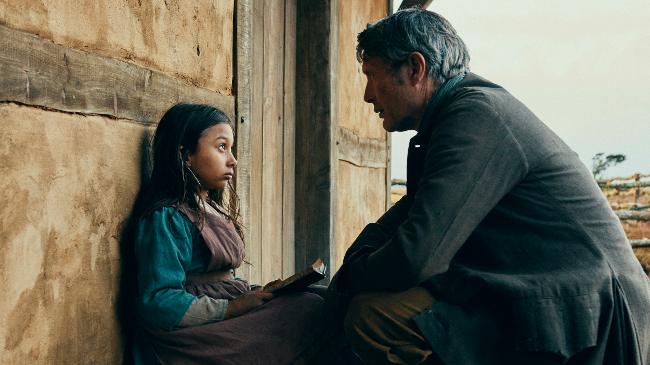
How did you cast the little girl? The chemistry was fantastic.
NA You mean Hagberg Melina, who plays Anmai Mus. She’s incredible. One of the reasons I fell in love with the novel and wanted to do the film was that character. Immediately, I was like, ‘Oh Holy God, there’s a really, really amazing character, very moving and funny.’ In the novel, she’s constantly swearing and being rude. We went through casting with over a hundred Danish girls, and we couldn’t find someone who had that spirit. Then in Sweden we found a casting agent who said, ‘I might have someone—she’s very young, and has never acted, but I think she fits this role very well.’ And the first time I saw her, I said, ‘Oh, please let her be a good actress, because she’s perfect.’ It’s exactly the same thing that happened on A Royal Affair, where we couldn’t find the character of the queen in Denmark so we had to go to Sweden and found Alicia Vikander there. Since it was kind of the same situation, I felt that it was maybe a good-luck charm for this film. And she was so fun to work with. She’s exactly like she is in the film, even more energetic, probably.
MM Normally it’s said about actors, ‘The worst thing you can do is work with children and animals.’ And I completely disagree, because there’s such an honesty in children, especially if they’re not trained. She’s not trained at all. And that honesty among us actors, who are overthinking stuff once in a while—if we can focus on her, all of a sudden, our job is just hanging there, and she will make you better. And she was a perfect example of that.
NA I have to say this anecdotally: there are some challenges to working with someone who’s not trained. She was sometimes low energy, you know—kids, and she was sometimes a little hungry or tired—and she’d say her line, ‘Can you… tell me… something about the… colony?’ And I’d go, ‘More energy’ and she’d go, ‘CAN YOU TELL ME SOMETHING ABOUT THE COLONY!’ You can’t really direct somebody who’s like nine years old—you just have to be lucky on the day. But again you (Mads) were really good about just fooling around and playing with her until we got it.
MM Yea, she’s fantastic—and we had a great time together. And then came the point when I had to tell her, ‘I’m a super annoying character, and I’m gonna hit you as well, and I’m gonna look grumpy for the majority of the film, but that’s not me.’ And then she was like, ‘What d’ya mean?’ She stiffened up a couple of times, so I had to go behind the camera and be the other me, and help her soften up. So that was the little back-and-forth, but it worked out, and she’s intact; she’s as sweet now as she was in the film.
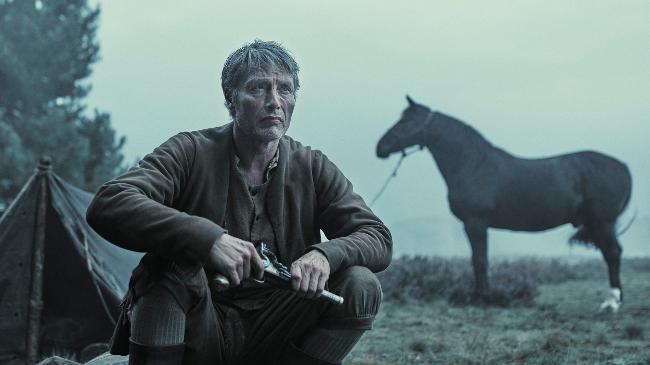
What about the logistics of working on the heath? Did it require any research on farming?
NA We shot on the real heath where some of the story actually happened—I don’t know if you noticed, but this is partly based on some true events—and it was tough, but nowhere near as tough as it would have been for those guys, because we could go and get a cappuccino in the trailer. When crew members say, ‘Oh, it was like a war, making this movie…’ I have to say, ‘I don’t think you’ve been in a real war’, and war is not like ‘let’s take a break and have some muffins’, so I think, really, we were fine, and we had our big coats, but we were also lucky with weather. Whenever we had a sunshine scene, the sun came out; and whenever we had a winter scene, it was raining. I think we were quite lucky on this one. Not just lucky—we were almost wrapping up a scene, and then all of a sudden, the sun came out, and we would go, ‘Let’s run—let’s do that little scene’, and then the actors would actually take some of the cables and start going, saying, “We can make that scene—it doesn’t take three hours. We can do it in five minutes.’
Preparing to grow potatoes—it’s just a little part of it, right? If that was the entirety of the film, I would have really dived into it. For me it was the dramatic story, the characters, whatever happened between them that was the heart of the film. I did my research and I was riding that horse and I was digging that grave and I was growing those potatoes, but it didn’t take me five months. I mean, preparation is one thing. Dedication is a different thing. So, preparation, always. Dedication, always. But when it comes to sanity, leaving your family and forcing your kids to call you a different name—that’s not me.
If and when you watch The Promised Land with a group, is there ever a moment when you always listen to the audience because you really want to hear how they react?
NA We probably have different stories for that. I am notoriously self-critical, so every film I’ve done, I kind of dislike a little bit, except for this one. I actually really like this one; this is the first time that I’ve felt really moved by my own film. It’s horribly narcissistic, but I actually got tears in my eyes. I don’t know why, but there’s one moment that’s quite funny, and that just shows you the difference between American and European audiences. When Ann Barbara kills Schinkel, in Denmark, there’s complete silence, and in America, it’s like “Whoo-hoo!” So I always enjoy that moment with an American audience, always.
MM I’ve seen it three times now. I’ve never seen it with a Danish audience, but I think in Spain, I saw it with half a Danish audience, and the jokes that we were aware of—they worked, in Danish. They’re hard to translate. There are certainly little details, and that will always be the case.
NA There’s very dry humor in Denmark.
MM And then just watching it again—the first time you watch it, you say, obviously, ‘What am I doing? What am I doing in the film? Does it work? Oh—you edited that out? That’s out!’ That’s the first time. And the second time, you start to enjoy the film, and the third time, I was caught emotionally by what I didn’t see the first time. For me—it was actually my most recent viewing—it was the first time the little girl throws the stick when she’s in the gypsy camp, and I pick it up and I throw it away, and then you stay on her with the camera for a while, and that breaks her heart. I didn’t see it the first time. It was really beautiful to see.
Which of the two co-screenwriters had more influence?
MM So the question is to me: did I know who wrote what? I guessed, and I guessed completely wrong, which is very interesting. I’ve worked with both of them—obviously with Anders Thomas a little more—but I’ve known Nikolaj now for ten years. I got it wrong! Completely! Some of the funny stuff was Nikolaj, and some of the more edgy stuff was the other one, and some of it was a mix of them. I got it wrong—which is good.
NA Yea, I remember that, because Anders Thomas is an amazing writer—he’s so funny. So whenever there was a funny line in the script, Mads was like, “Oh, Anders Thomas—there you go again,” and I was like, “That was ME! I wrote that line!”
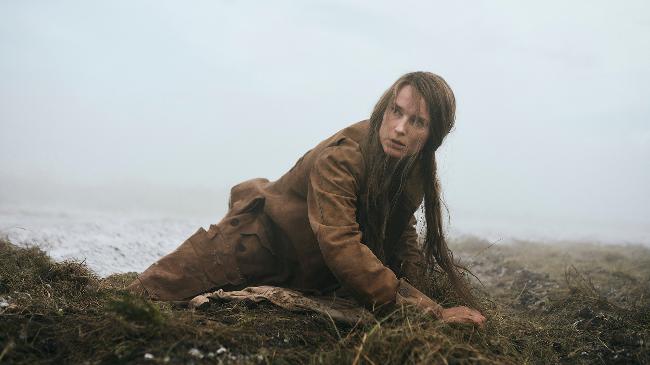
How did you adapt Ann Barbara as a character?
NA Oh, my God—I could talk for hours about that, because part of what I loved about the book, which was written by a woman called Ida Jessen, a big female novelist in Denmark, was the character Ann Barbara. What I wanted to do was to take this sort of archetypical female character of this kind of period piece—who always seems to be a little invisible, or in the background, doing whatever the guy says—and turn that character completely around and make her into a crazy avenging angel in the end, and the one who actually saves the day, you know? I worked a lot with Amanda Collin. We kept saying, she has to feel a little invisible in the beginning. We seriously kept her behind because I wanted her to grow and grow and grow until she almost became, and I’m sorry (as he nods to Mads Mikkelsen) the main character of the film! I feel that it works. She takes you by surprise. We don’t think she will be that huge of a character. In the beginning, she’s with this guy, and refugees, and so on, but she was so vital to the whole process of writing and making the film. And I think we found the perfect actress in Amanda as well, who’s not done a lot in Denmark. Some of you may have seen her in Raised by Wolves.
MM Can I add, that this is 1754, or 1755. There are very strict rules. I’m not talking about just women—I’m talking about everyone. There might be 1% of the people in Denmark who have a say, in anything. And the women were actually on the side. You take the noble woman—her destiny is set in stone. Even she, we would say, is a privileged person, but not at all. She’s completely lost in the wind of what’s happening historically. And then we have the little girl, so we have three really strong women in this story, which is interesting, because we’re not trying to force a 2023 moral into the film, but all three of them are very strong characters, within their own rights, in the time period. They’re not trying to be 2023. They are strong in that era. And that’s what I always found very fascinating, reading the story.
What about adapting the book in general?
MM So what are you leaving out, what did you keep in, and for what reasons? And did I read the book? No, I did not read the book. For me, reading a book before shooting a film, or in the midst of shooting a film, will be disloyal, in the sense that they make my bible, and this is the bible we’re working on. If I read it, I might get inspired. But I also might get a little, as you say, ‘Why is that not in there? What happened to that one?’ I will read the book very soon, because I’m curious—there’s obviously more. It’s like an eight-hour film, so I have to read it.
NA Yea, adapting the book… The novel is extremely beautiful. It’s concerned with nature, so there are lots of passages about how the plants grow, and the sun, and everything in nature, and honestly, that film—we wouldn’t be here right now, because it would have been a wonderful, beautiful film that two people had seen, and it would have been, like you said, eight hours long. So there’s obviously a lot of that nature stuff that we had to distill. I think most characters are almost the same as in the book, but there’s definitely a distillation of plot, something you always do when adapting. I even remember—I actually adapted The Girl with the Dragon Tatto, the original—and I seem to remember that there was a feeling that we were quite loyal to that one, but we actually distilled it quite a lot and changed it quite a lot. As long as you have the heart and soul of what you’re adapting, I think you’re free to do a lot.
The Promised Land (Bastarden)
Producer: Louise Vesth; Director: Nikolaj Arcel; Screenplay: Nikolaj Arcel, Anders Thomas Jensen, based on the novel "The Captain and Ann Barbara" by Ida Jessen; Cinematography: Rasmus Videbæk; Editing: Olivier Bugge Co; Music: Dan Romer; Production Design: Jette Lehmann; Costumes: Kicki Ilander.
Cast: Mads Mikkelsen, Simon Bennebjerg, Amanda Collin, Kristine Kujath Thorp, Hagberg Melina, Gustav Lindh.
127 min., Color. In Danish with English subtitles.